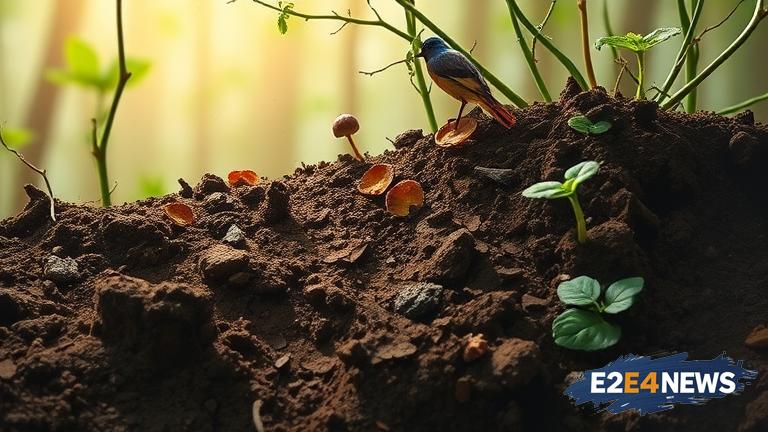Soil microbes, the tiny organisms living in the soil, have been found to have a profound impact on the environment, human health, and even our minds. These microorganisms, including bacteria, fungi, and other microbes, work together to break down organic matter, fix nitrogen, and solubilize minerals, making them available to plants. The soil microbiome is a complex network of interactions between microorganisms, plants, and the environment, and it plays a critical role in maintaining ecosystem balance. Research has shown that soil microbes can influence human health by producing compounds that have antimicrobial and antifungal properties, which can help to boost the immune system. Additionally, soil microbes have been found to produce neurotransmitters and hormones that can affect mood, cognitive function, and behavior. The connection between soil microbes and the human brain is still not fully understood, but studies have suggested that exposure to soil microbes can have a positive impact on mental health, reducing stress and anxiety. Furthermore, soil microbes have been found to play a role in shaping our minds, influencing our thoughts, feelings, and behaviors. The soil microbiome is also closely linked to the gut microbiome, and an imbalance of the soil microbiome can have a negative impact on human health. Soil microbes can also affect the way we think and feel by producing compounds that can alter brain chemistry. For example, the soil microbe Mycobacterium vaccae has been found to produce a compound that can increase the production of serotonin, a neurotransmitter that helps to regulate mood. Other soil microbes, such as those in the genus Streptomyces, have been found to produce compounds that can help to reduce inflammation and improve cognitive function. The study of soil microbes and their impact on human health is a rapidly growing field, with new research emerging all the time. Scientists are working to understand the complex relationships between soil microbes, plants, and the environment, and to develop new ways to harness the power of the soil microbiome. This research has the potential to revolutionize our understanding of human health and the natural world, and to lead to the development of new treatments and therapies. In addition to their impact on human health, soil microbes also play a critical role in maintaining ecosystem balance. They help to break down organic matter, fix nitrogen, and solubilize minerals, making them available to plants. This process helps to maintain soil fertility, structure, and overall health. Soil microbes also play a role in the carbon cycle, helping to sequester carbon in the soil and reduce greenhouse gas emissions. The soil microbiome is also closely linked to the health of plants, and an imbalance of the soil microbiome can have a negative impact on plant growth and productivity. Researchers are working to develop new ways to promote soil health, including the use of cover crops, crop rotation, and organic amendments. These practices can help to increase the diversity and abundance of soil microbes, leading to improved soil fertility and overall ecosystem health. Overall, the study of soil microbes is a fascinating and rapidly evolving field, with far-reaching implications for human health, ecosystem balance, and the natural world. As we continue to learn more about the complex relationships between soil microbes, plants, and the environment, we may uncover new and innovative ways to promote soil health, improve human health, and protect the planet. The connection between soil microbes and human health is complex and multifaceted, and it is an area of ongoing research and discovery. However, one thing is clear: the soil microbiome plays a critical role in maintaining ecosystem balance and promoting human health, and it is an area that deserves further study and exploration. By understanding the intricate relationships between soil microbes, plants, and the environment, we may be able to unlock new secrets of the natural world and develop innovative solutions to some of the world’s most pressing problems.
